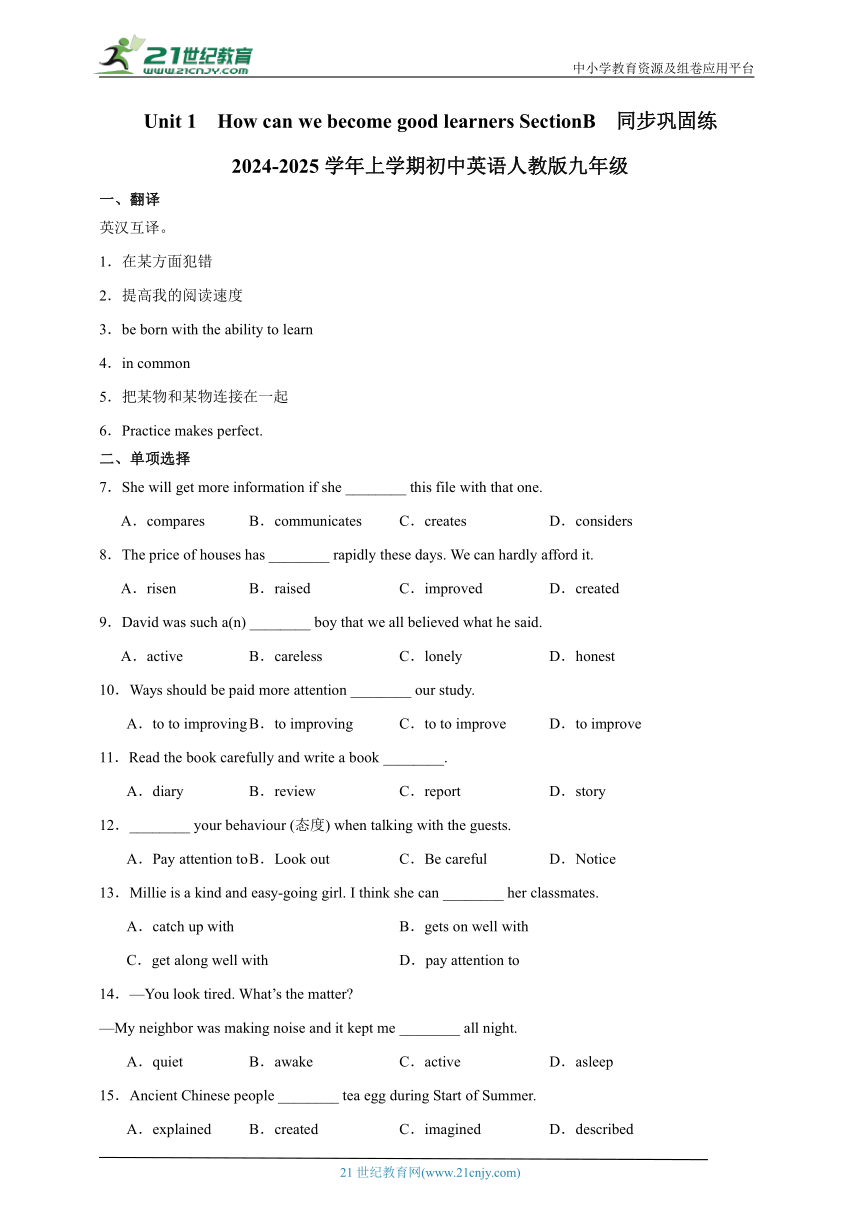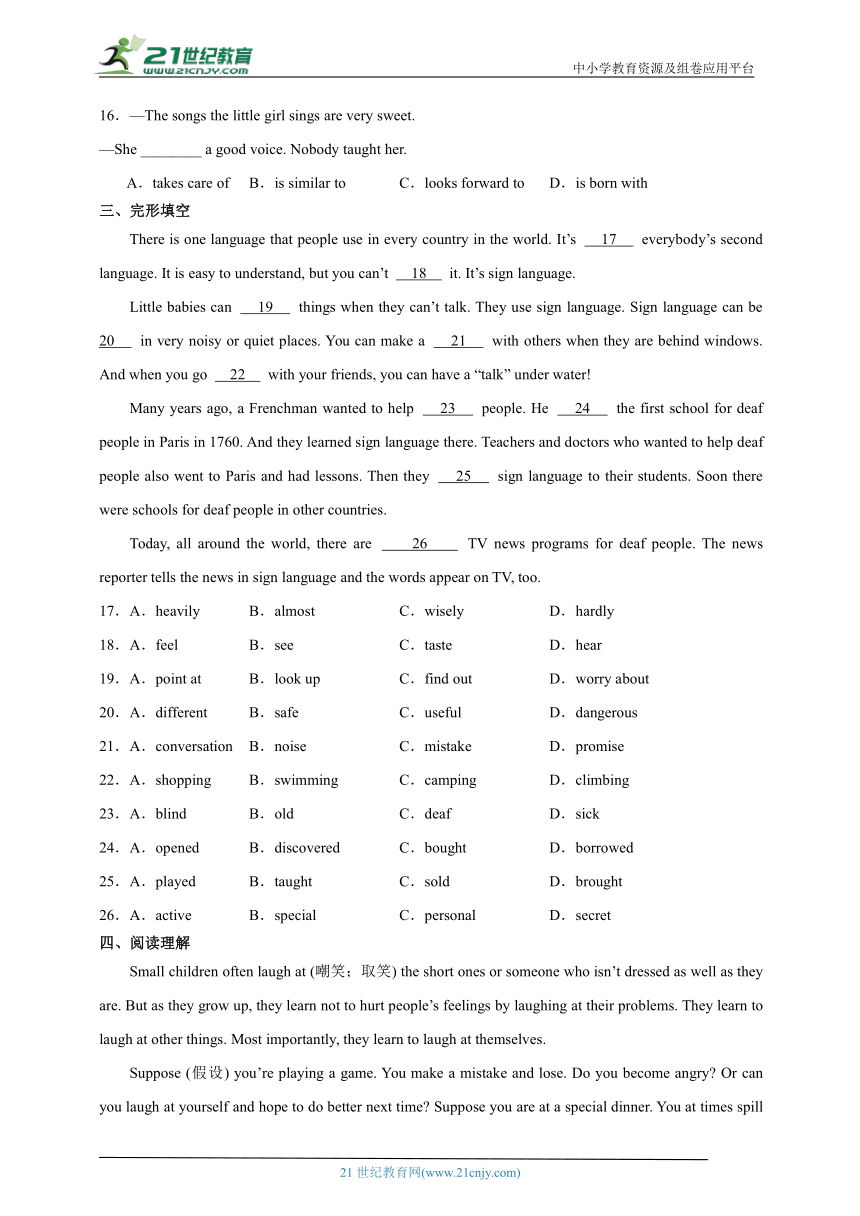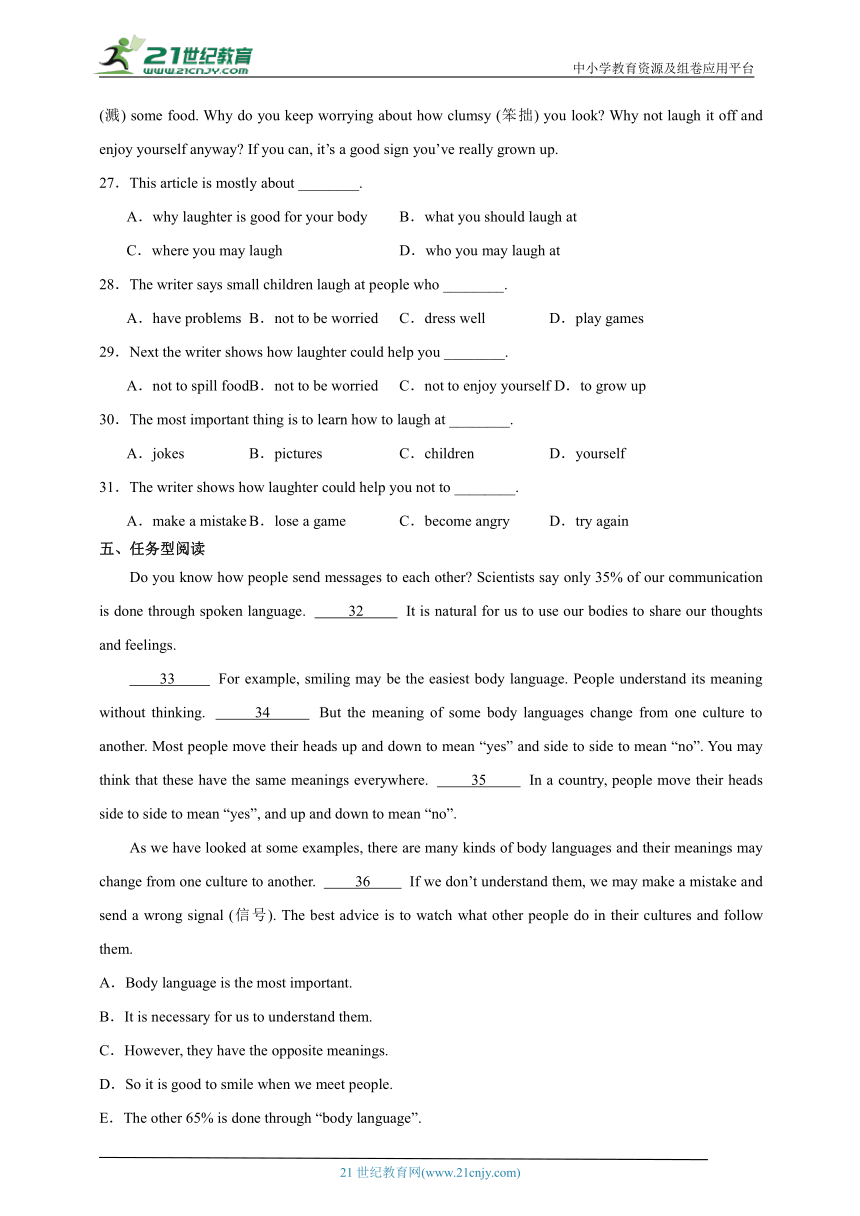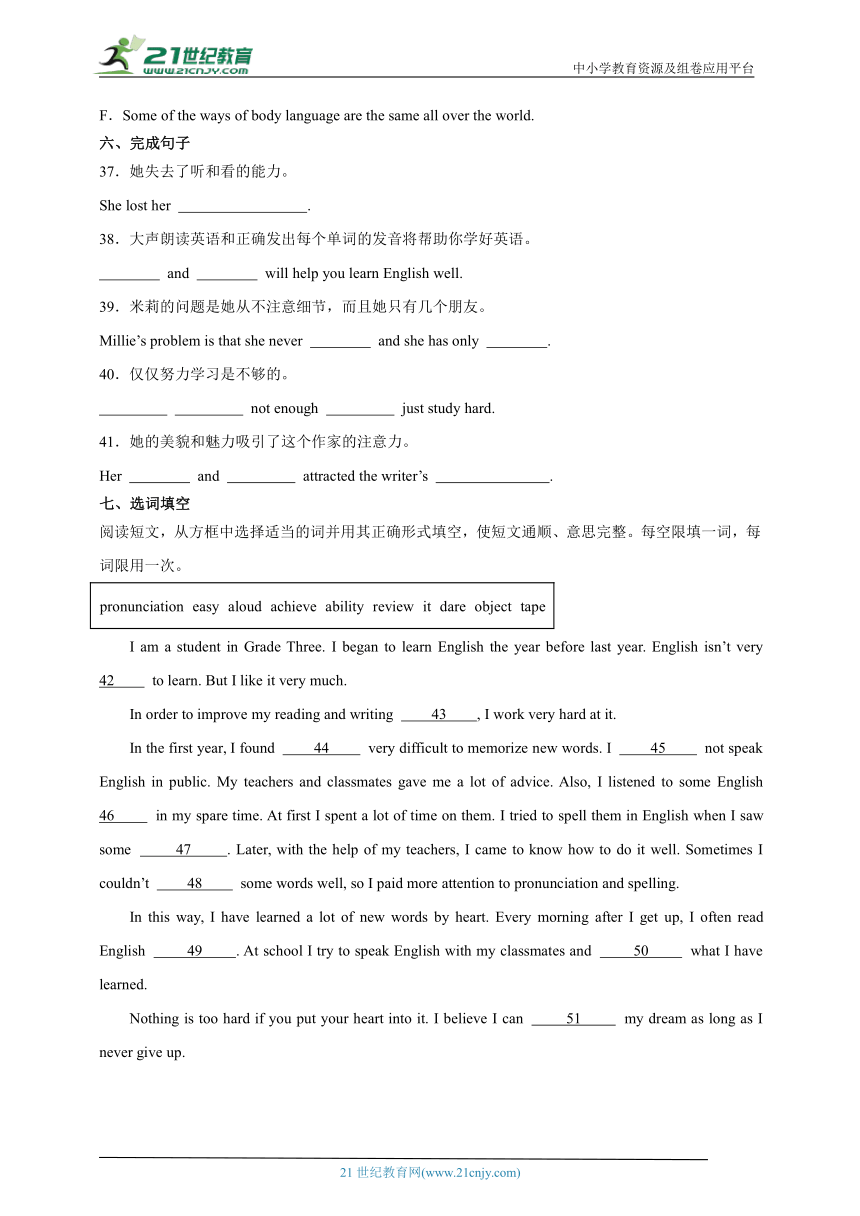Unit 1 How can we become good learners SectionB 同步巩固练 2024-2025学年上学期初中英语人教版九年级
文档属性
| 名称 | Unit 1 How can we become good learners SectionB 同步巩固练 2024-2025学年上学期初中英语人教版九年级 |  | |
| 格式 | docx | ||
| 文件大小 | 51.9KB | ||
| 资源类型 | 试卷 | ||
| 版本资源 | 人教新目标(Go for it)版 | ||
| 科目 | 英语 | ||
| 更新时间 | 2024-11-11 15:42:28 | ||
图片预览




文档简介
中小学教育资源及组卷应用平台
Unit 1 How can we become good learners SectionB 同步巩固练
2024-2025学年上学期初中英语人教版九年级
一、翻译
英汉互译。
1.在某方面犯错
2.提高我的阅读速度
3.be born with the ability to learn
4.in common
5.把某物和某物连接在一起
6.Practice makes perfect.
二、单项选择
7.She will get more information if she ________ this file with that one.
A.compares B.communicates C.creates D.considers
8.The price of houses has ________ rapidly these days. We can hardly afford it.
A.risen B.raised C.improved D.created
9.David was such a(n) ________ boy that we all believed what he said.
A.active B.careless C.lonely D.honest
10.Ways should be paid more attention ________ our study.
A.to to improving B.to improving C.to to improve D.to improve
11.Read the book carefully and write a book ________.
A.diary B.review C.report D.story
12.________ your behaviour (态度) when talking with the guests.
A.Pay attention to B.Look out C.Be careful D.Notice
13.Millie is a kind and easy going girl. I think she can ________ her classmates.
A.catch up with B.gets on well with
C.get along well with D.pay attention to
14.—You look tired. What’s the matter
—My neighbor was making noise and it kept me ________ all night.
A.quiet B.awake C.active D.asleep
15.Ancient Chinese people ________ tea egg during Start of Summer.
A.explained B.created C.imagined D.described
16.—The songs the little girl sings are very sweet.
—She ________ a good voice. Nobody taught her.
A.takes care of B.is similar to C.looks forward to D.is born with
三、完形填空
There is one language that people use in every country in the world. It’s 17 everybody’s second language. It is easy to understand, but you can’t 18 it. It’s sign language.
Little babies can 19 things when they can’t talk. They use sign language. Sign language can be 20 in very noisy or quiet places. You can make a 21 with others when they are behind windows. And when you go 22 with your friends, you can have a “talk” under water!
Many years ago, a Frenchman wanted to help 23 people. He 24 the first school for deaf people in Paris in 1760. And they learned sign language there. Teachers and doctors who wanted to help deaf people also went to Paris and had lessons. Then they 25 sign language to their students. Soon there were schools for deaf people in other countries.
Today, all around the world, there are 26 TV news programs for deaf people. The news reporter tells the news in sign language and the words appear on TV, too.
17.A.heavily B.almost C.wisely D.hardly
18.A.feel B.see C.taste D.hear
19.A.point at B.look up C.find out D.worry about
20.A.different B.safe C.useful D.dangerous
21.A.conversation B.noise C.mistake D.promise
22.A.shopping B.swimming C.camping D.climbing
23.A.blind B.old C.deaf D.sick
24.A.opened B.discovered C.bought D.borrowed
25.A.played B.taught C.sold D.brought
26.A.active B.special C.personal D.secret
四、阅读理解
Small children often laugh at (嘲笑;取笑) the short ones or someone who isn’t dressed as well as they are. But as they grow up, they learn not to hurt people’s feelings by laughing at their problems. They learn to laugh at other things. Most importantly, they learn to laugh at themselves.
Suppose (假设) you’re playing a game. You make a mistake and lose. Do you become angry Or can you laugh at yourself and hope to do better next time Suppose you are at a special dinner. You at times spill (溅) some food. Why do you keep worrying about how clumsy (笨拙) you look Why not laugh it off and enjoy yourself anyway If you can, it’s a good sign you’ve really grown up.
27.This article is mostly about ________.
A.why laughter is good for your body B.what you should laugh at
C.where you may laugh D.who you may laugh at
28.The writer says small children laugh at people who ________.
A.have problems B.not to be worried C.dress well D.play games
29.Next the writer shows how laughter could help you ________.
A.not to spill food B.not to be worried C.not to enjoy yourself D.to grow up
30.The most important thing is to learn how to laugh at ________.
A.jokes B.pictures C.children D.yourself
31.The writer shows how laughter could help you not to ________.
A.make a mistake B.lose a game C.become angry D.try again
五、任务型阅读
Do you know how people send messages to each other Scientists say only 35% of our communication is done through spoken language. 32 It is natural for us to use our bodies to share our thoughts and feelings.
33 For example, smiling may be the easiest body language. People understand its meaning without thinking. 34 But the meaning of some body languages change from one culture to another. Most people move their heads up and down to mean “yes” and side to side to mean “no”. You may think that these have the same meanings everywhere. 35 In a country, people move their heads side to side to mean “yes”, and up and down to mean “no”.
As we have looked at some examples, there are many kinds of body languages and their meanings may change from one culture to another. 36 If we don’t understand them, we may make a mistake and send a wrong signal (信号). The best advice is to watch what other people do in their cultures and follow them.
A.Body language is the most important.
B.It is necessary for us to understand them.
C.However, they have the opposite meanings.
D.So it is good to smile when we meet people.
E.The other 65% is done through “body language”.
F.Some of the ways of body language are the same all over the world.
六、完成句子
37.她失去了听和看的能力。
She lost her .
38.大声朗读英语和正确发出每个单词的发音将帮助你学好英语。
and will help you learn English well.
39.米莉的问题是她从不注意细节,而且她只有几个朋友。
Millie’s problem is that she never and she has only .
40.仅仅努力学习是不够的。
not enough just study hard.
41.她的美貌和魅力吸引了这个作家的注意力。
Her and attracted the writer’s .
七、选词填空
阅读短文,从方框中选择适当的词并用其正确形式填空,使短文通顺、意思完整。每空限填一词,每词限用一次。
pronunciation easy aloud achieve ability review it dare object tape
I am a student in Grade Three. I began to learn English the year before last year. English isn’t very 42 to learn. But I like it very much.
In order to improve my reading and writing 43 , I work very hard at it.
In the first year, I found 44 very difficult to memorize new words. I 45 not speak English in public. My teachers and classmates gave me a lot of advice. Also, I listened to some English 46 in my spare time. At first I spent a lot of time on them. I tried to spell them in English when I saw some 47 . Later, with the help of my teachers, I came to know how to do it well. Sometimes I couldn’t 48 some words well, so I paid more attention to pronunciation and spelling.
In this way, I have learned a lot of new words by heart. Every morning after I get up, I often read English 49 . At school I try to speak English with my classmates and 50 what I have learned.
Nothing is too hard if you put your heart into it. I believe I can 51 my dream as long as I never give up.
参考答案:
1.make mistakes in 2.increase my reading speed 3.有学习的天赋 4.共同的 5.connect...with 6.熟能生巧。
7.A
考查动词辨析。compares比较;communicates交流;creates创造;considers仔细考虑。根据“if she…this file with that one.”可知,这里指把两个文件进行比较,compare A with B意为“将A和B进行比较”。故选A。
8.A
考查动词辨析。rise上升,过去分词risen;raise举起,过去分词raised;improve改进,过去分词improved;create创造,过去分词created。根据“The price of houses”可知,此处应是房价上升,排除C和D选项。此空后无名词,应填不及物动词risen,故选A。
9.D
考查形容词辨析。active积极的;careless粗心的;lonely孤独的;honest诚实的。根据“that we all believed what he said”可知,他很诚实,故选D。
10.C
考查固定短语和非谓语。pay attention to sth“注意某事物”,句子是被动语态,结构为sth be paid attention to,此处to是介词。注意方法的目的是为了提高学习,用to improve作目的状语,此处to为不定式符号。故选C。
11.B
考查名词辨析。diary日记;review评论;report报告;story故事。根据“Read the book carefully”可知此处指的是认真去读书并写书评。故选B。
12.A
考查动词短语辨析。Pay attention to注意;Look out小心;Be careful小心;Notice注意。根据“your behaviour (态度) when talking with the guests”可知,与他人交谈要注意举止,故选A。
13.C
考查动词短语辨析。catch up with赶上;gets on well with相处得好;get along well with相处得好;pay attention to注意。根据“Millie is a kind and easy going girl. I think she can...her classmates.”可知,米莉能和同学相处得好,情态动词can后用动词原形。故选C。
14.B
考查形容词辨析,quiet安静的;awake醒的;active活跃的;asleep睡着的。根据“My neighbor was making noise”我的邻居在制造噪音,可知应该是吵得彻夜难眠,故选B。
15.B
考查动词辨析。explained解释;created创造;imagined想象;described描述。根据“Ancient Chinese people … tea egg during Start of summer.”可知,此处指古代中国人创造了茶叶蛋,created符合语境。故选B。
16.D
考查短语辨析。takes care of照顾;is similar to与……相似;looks forward to期待;is born with天生具有。根据“Nobody taught her”可知,她的嗓音不是后天形成的而是天生具有的,故选D。
17.B 18.D 19.A 20.C 21.A 22.B 23.C 24.A 25.B 26.B
17.句意:它几乎是每个人的第二语言。
heavily沉重地;almost几乎;wisely明智地;hardly几乎不。根据“There is one language that people use in every country in the world.”可知是几乎每个人都使用。故选B。
18.句意:它很容易理解,但你听不到。
feel感觉;see看到;taste品尝;hear听到。根据“It’s sign language.”可知是听不到。故选D。
19.句意:小婴儿在不会说话的时候可以指着东西。
point at指向;look up查阅;find out查明;worry about担心。根据“things when they can’t talk”可知是指着东西。故选A。
20.句意:手语在非常嘈杂或安静的地方都很有用。
different不同的;safe安全的;useful有用的;dangerous危险的。根据“in very noisy or quiet places.”可知是在很嘈杂和安静的地方是“有用的”。故选C。
21.句意:当别人在窗户后面时,你可以和他们交谈。
conversation交谈;noise噪音;mistake错误;promise承诺。根据“with others when they are behind windows.”可知,是隔着窗户的时候可以交谈。故选A。
22.句意:当你和你的朋友去游泳时,你可以在水下“交谈”!
shopping购物;swimming游泳;camping野营;climbing攀登。根据“under water”可知是游泳的时候,可以在水下交谈。故选B。
23.句意:许多年前,一个法国人想帮助聋哑人。
blind瞎的;old老的;deaf聋的;sick病的。根据“for deaf people”可知是聋的人们。故选C。
24.句意:1760年,他在巴黎开办了第一所聋哑学校。
opened开办;discovered发现;bought买;borrowed借。根据“the first school for deaf people in Paris in 1760”可知是开办学校。故选A。
25.句意:然后他们教学生手语。
played玩;taught教;sold卖;brought带来。根据“And they learned sign language there.”以及“to their students”可知是教学生。故选B。
26.句意:当今,世界各地都有专门为聋哑人准备的电视新闻节目。
active活跃的;special专门的;personal私人的;secret秘密的。根据“for deaf people.”可知是专门给聋哑人的。故选B。
27.B 28.A 29.B 30.D 31.C
27.主旨大意题。文章第一段引出了“随着人们长大,人们学会不去嘲笑别人的问题,与此相反,他们学会了自嘲”这一观点;文章第二段中具体阐述了为什么自嘲、自嘲什么。综上所述,文章的主旨是“你应该嘲笑什么”。故选B。
28.细节理解题。根据“Small children often laugh at... But as they grow up, they learn not to hurt people’s feelings by laughing at their problems.”可知,小孩会嘲笑有问题的人。故选A。
29.推理判断题。根据“Why do you keep worrying about how clumsy (笨拙) you look Why not laugh it off and enjoy yourself anyway ”可知,笑可以帮助我们消除尴尬,免于担心自己看上去很笨拙。故选B。
30.细节理解题。根据“Most importantly, they learn to laugh at themselves.”可知,最重要的是学会如何自嘲。故选D。
31.推理判断题。根据“You make a mistake and lose. Do you become angry Or can you laugh at yourself and hope to do better next time ”可知,犯了错误输了比赛后,可能会很生气,但也可以自嘲一下然后希望下次做得更好,所以笑容不能帮助我们“不去犯错”,“不输掉比赛”或“再尝试一次”,但可以让我们不再“变得生气”。故选C。
32.E 33.F 34.D 35.C 36.B
32.根据“Scientists say only 35% of our communication is done through spoken language.”可知这里介绍了一部分比例的人使用口语,接下来应该说剩下比例的人通过其他的某种途径交流。E“另外65%是通过‘肢体语言’完成的。”符合语境。故选E。
33.根据“For example, smiling may be the easiest body language.”可知下文举例说明了某种肢体语言的广泛运用。F“有些肢体语言在世界各地都是一样的。”符合语境。故选F。
34.根据“For example, smiling may be the easiest body language. People understand its meaning without thinking.”可知上文举例了“微笑”,D“所以当我们遇到别人的时候,微笑是很好的。”符合语境。故选D。
35.根据“In a country, people move their heads side to side to mean ‘yes’, and up and down to mean ‘no’.”可知这里给出了同一个肢体语言有不同意思的例子,推断设空处应该要表述转折之意。C“然而,它们有相反的意思。”符合语境。故选C。
36.根据“If we don’t understand them, we may make a mistake and send a wrong signal (信号).”可知有必要了解不同的肢体语言的意思。B“我们有必要了解它们。”符合语境。故选B。
37.ability to hear and see
“……的能力”应用名词短语ability to do sth,其中动词不定式作后置定语,“听”是动词hear,“看”是动词see,“和”是连词and。故填ability to hear and see。
38. Reading English aloud pronouncing each word correctly
“大声朗读英语”译成:read English aloud;“正确发出每个单词的发音”译成:pronounce each word correctly。此处需用动名词作主语,首字母大写。故填Reading English aloud;pronouncing each word correctly。
39. pays attention to details a few friends
“注意”pay attention to;“细节”details;“几个朋友”a few friends。主现从不限,此处讲述一般事实,用一般现在时,主语she后用动词第三人称单数形式pays。故填pays attention to details;a few friends。
40. It is to
考查动词不定式作主语;又根据后半句题干空格可知,考查it代替不定式作形式主语,句型为It’s + adj + to do sth表示“做某事是……的”。enough“足够的”。故填It;is;to。
41. beauty charm attention
beauty and charm“美貌和魅力”,attract one’s attention“吸引某人的注意”,故此处为(1). beauty (2). charm (3). attention 。
42.easy 43.abilities 44.it 45.dare 46.tapes 47.objects 48.pronounce 49.aloud 50.review 51.achieve
42.句意:英语不是很容易学的。根据“But I like it very much.”和备选词汇可知,英语不是容易学的,easy作表语,故填easy。
43.句意:为了提高我的阅读和写作能力,我很努力学习。根据“improve my reading and writing”和备选词汇可知,提高阅读和写作能力,需要名词复数,abilities“能力”符合句意,故填abilities。
44.句意:在第一年,我发现很难记住新单词。根据“very difficult to memorize new words.”和备选词汇可知,it代替真正的宾语作形式宾语,故填it。
45.句意:我不敢在公共场合说英语。根据“not speak English in public”和备选词汇可知,不敢在公共场合说英语,故填dare。
46.句意:此外,我在业余时间听了一些英语磁带。根据“listened to some English ”和备选词汇可知,听英语录音带,需要名词复数形式,故填tapes。
47.句意:当我看到一些东西时,我试着用英语拼写它们。根据“I tried to spell them in English”和备选词汇可知,看到一些物品就想着用英语说出来,需要名词复数,objects符合句意,故填objects。
48.句意:有时我发不好一些单词的音,所以我更加注意发音和拼写。根据“some words well”和备选词汇可知,有些单词发不好,情态动词后接动词原形,pronounce“发音”符合句意,故填pronounce。
49.句意:每天早上我起床后,我经常大声读英语。根据“ I often read English”和备选词汇可知,大声读英语,aloud符合句意,故填aloud。
50.句意:在学校,我试着和我的同学说英语,复习我学过的东西。根据“what I have learned”和备选词汇可知,复习所学内容,时态是一般现在时,主语是I,动词用原形,故填review。
51.句意:我相信只要我不放弃,我就能实现我的梦想。根据“ my dream”和备选词汇可知,实现梦想,can后接动词原形,故填achieve。
21世纪教育网 www.21cnjy.com 精品试卷·第 2 页 (共 2 页)
21世纪教育网(www.21cnjy.com)
Unit 1 How can we become good learners SectionB 同步巩固练
2024-2025学年上学期初中英语人教版九年级
一、翻译
英汉互译。
1.在某方面犯错
2.提高我的阅读速度
3.be born with the ability to learn
4.in common
5.把某物和某物连接在一起
6.Practice makes perfect.
二、单项选择
7.She will get more information if she ________ this file with that one.
A.compares B.communicates C.creates D.considers
8.The price of houses has ________ rapidly these days. We can hardly afford it.
A.risen B.raised C.improved D.created
9.David was such a(n) ________ boy that we all believed what he said.
A.active B.careless C.lonely D.honest
10.Ways should be paid more attention ________ our study.
A.to to improving B.to improving C.to to improve D.to improve
11.Read the book carefully and write a book ________.
A.diary B.review C.report D.story
12.________ your behaviour (态度) when talking with the guests.
A.Pay attention to B.Look out C.Be careful D.Notice
13.Millie is a kind and easy going girl. I think she can ________ her classmates.
A.catch up with B.gets on well with
C.get along well with D.pay attention to
14.—You look tired. What’s the matter
—My neighbor was making noise and it kept me ________ all night.
A.quiet B.awake C.active D.asleep
15.Ancient Chinese people ________ tea egg during Start of Summer.
A.explained B.created C.imagined D.described
16.—The songs the little girl sings are very sweet.
—She ________ a good voice. Nobody taught her.
A.takes care of B.is similar to C.looks forward to D.is born with
三、完形填空
There is one language that people use in every country in the world. It’s 17 everybody’s second language. It is easy to understand, but you can’t 18 it. It’s sign language.
Little babies can 19 things when they can’t talk. They use sign language. Sign language can be 20 in very noisy or quiet places. You can make a 21 with others when they are behind windows. And when you go 22 with your friends, you can have a “talk” under water!
Many years ago, a Frenchman wanted to help 23 people. He 24 the first school for deaf people in Paris in 1760. And they learned sign language there. Teachers and doctors who wanted to help deaf people also went to Paris and had lessons. Then they 25 sign language to their students. Soon there were schools for deaf people in other countries.
Today, all around the world, there are 26 TV news programs for deaf people. The news reporter tells the news in sign language and the words appear on TV, too.
17.A.heavily B.almost C.wisely D.hardly
18.A.feel B.see C.taste D.hear
19.A.point at B.look up C.find out D.worry about
20.A.different B.safe C.useful D.dangerous
21.A.conversation B.noise C.mistake D.promise
22.A.shopping B.swimming C.camping D.climbing
23.A.blind B.old C.deaf D.sick
24.A.opened B.discovered C.bought D.borrowed
25.A.played B.taught C.sold D.brought
26.A.active B.special C.personal D.secret
四、阅读理解
Small children often laugh at (嘲笑;取笑) the short ones or someone who isn’t dressed as well as they are. But as they grow up, they learn not to hurt people’s feelings by laughing at their problems. They learn to laugh at other things. Most importantly, they learn to laugh at themselves.
Suppose (假设) you’re playing a game. You make a mistake and lose. Do you become angry Or can you laugh at yourself and hope to do better next time Suppose you are at a special dinner. You at times spill (溅) some food. Why do you keep worrying about how clumsy (笨拙) you look Why not laugh it off and enjoy yourself anyway If you can, it’s a good sign you’ve really grown up.
27.This article is mostly about ________.
A.why laughter is good for your body B.what you should laugh at
C.where you may laugh D.who you may laugh at
28.The writer says small children laugh at people who ________.
A.have problems B.not to be worried C.dress well D.play games
29.Next the writer shows how laughter could help you ________.
A.not to spill food B.not to be worried C.not to enjoy yourself D.to grow up
30.The most important thing is to learn how to laugh at ________.
A.jokes B.pictures C.children D.yourself
31.The writer shows how laughter could help you not to ________.
A.make a mistake B.lose a game C.become angry D.try again
五、任务型阅读
Do you know how people send messages to each other Scientists say only 35% of our communication is done through spoken language. 32 It is natural for us to use our bodies to share our thoughts and feelings.
33 For example, smiling may be the easiest body language. People understand its meaning without thinking. 34 But the meaning of some body languages change from one culture to another. Most people move their heads up and down to mean “yes” and side to side to mean “no”. You may think that these have the same meanings everywhere. 35 In a country, people move their heads side to side to mean “yes”, and up and down to mean “no”.
As we have looked at some examples, there are many kinds of body languages and their meanings may change from one culture to another. 36 If we don’t understand them, we may make a mistake and send a wrong signal (信号). The best advice is to watch what other people do in their cultures and follow them.
A.Body language is the most important.
B.It is necessary for us to understand them.
C.However, they have the opposite meanings.
D.So it is good to smile when we meet people.
E.The other 65% is done through “body language”.
F.Some of the ways of body language are the same all over the world.
六、完成句子
37.她失去了听和看的能力。
She lost her .
38.大声朗读英语和正确发出每个单词的发音将帮助你学好英语。
and will help you learn English well.
39.米莉的问题是她从不注意细节,而且她只有几个朋友。
Millie’s problem is that she never and she has only .
40.仅仅努力学习是不够的。
not enough just study hard.
41.她的美貌和魅力吸引了这个作家的注意力。
Her and attracted the writer’s .
七、选词填空
阅读短文,从方框中选择适当的词并用其正确形式填空,使短文通顺、意思完整。每空限填一词,每词限用一次。
pronunciation easy aloud achieve ability review it dare object tape
I am a student in Grade Three. I began to learn English the year before last year. English isn’t very 42 to learn. But I like it very much.
In order to improve my reading and writing 43 , I work very hard at it.
In the first year, I found 44 very difficult to memorize new words. I 45 not speak English in public. My teachers and classmates gave me a lot of advice. Also, I listened to some English 46 in my spare time. At first I spent a lot of time on them. I tried to spell them in English when I saw some 47 . Later, with the help of my teachers, I came to know how to do it well. Sometimes I couldn’t 48 some words well, so I paid more attention to pronunciation and spelling.
In this way, I have learned a lot of new words by heart. Every morning after I get up, I often read English 49 . At school I try to speak English with my classmates and 50 what I have learned.
Nothing is too hard if you put your heart into it. I believe I can 51 my dream as long as I never give up.
参考答案:
1.make mistakes in 2.increase my reading speed 3.有学习的天赋 4.共同的 5.connect...with 6.熟能生巧。
7.A
考查动词辨析。compares比较;communicates交流;creates创造;considers仔细考虑。根据“if she…this file with that one.”可知,这里指把两个文件进行比较,compare A with B意为“将A和B进行比较”。故选A。
8.A
考查动词辨析。rise上升,过去分词risen;raise举起,过去分词raised;improve改进,过去分词improved;create创造,过去分词created。根据“The price of houses”可知,此处应是房价上升,排除C和D选项。此空后无名词,应填不及物动词risen,故选A。
9.D
考查形容词辨析。active积极的;careless粗心的;lonely孤独的;honest诚实的。根据“that we all believed what he said”可知,他很诚实,故选D。
10.C
考查固定短语和非谓语。pay attention to sth“注意某事物”,句子是被动语态,结构为sth be paid attention to,此处to是介词。注意方法的目的是为了提高学习,用to improve作目的状语,此处to为不定式符号。故选C。
11.B
考查名词辨析。diary日记;review评论;report报告;story故事。根据“Read the book carefully”可知此处指的是认真去读书并写书评。故选B。
12.A
考查动词短语辨析。Pay attention to注意;Look out小心;Be careful小心;Notice注意。根据“your behaviour (态度) when talking with the guests”可知,与他人交谈要注意举止,故选A。
13.C
考查动词短语辨析。catch up with赶上;gets on well with相处得好;get along well with相处得好;pay attention to注意。根据“Millie is a kind and easy going girl. I think she can...her classmates.”可知,米莉能和同学相处得好,情态动词can后用动词原形。故选C。
14.B
考查形容词辨析,quiet安静的;awake醒的;active活跃的;asleep睡着的。根据“My neighbor was making noise”我的邻居在制造噪音,可知应该是吵得彻夜难眠,故选B。
15.B
考查动词辨析。explained解释;created创造;imagined想象;described描述。根据“Ancient Chinese people … tea egg during Start of summer.”可知,此处指古代中国人创造了茶叶蛋,created符合语境。故选B。
16.D
考查短语辨析。takes care of照顾;is similar to与……相似;looks forward to期待;is born with天生具有。根据“Nobody taught her”可知,她的嗓音不是后天形成的而是天生具有的,故选D。
17.B 18.D 19.A 20.C 21.A 22.B 23.C 24.A 25.B 26.B
17.句意:它几乎是每个人的第二语言。
heavily沉重地;almost几乎;wisely明智地;hardly几乎不。根据“There is one language that people use in every country in the world.”可知是几乎每个人都使用。故选B。
18.句意:它很容易理解,但你听不到。
feel感觉;see看到;taste品尝;hear听到。根据“It’s sign language.”可知是听不到。故选D。
19.句意:小婴儿在不会说话的时候可以指着东西。
point at指向;look up查阅;find out查明;worry about担心。根据“things when they can’t talk”可知是指着东西。故选A。
20.句意:手语在非常嘈杂或安静的地方都很有用。
different不同的;safe安全的;useful有用的;dangerous危险的。根据“in very noisy or quiet places.”可知是在很嘈杂和安静的地方是“有用的”。故选C。
21.句意:当别人在窗户后面时,你可以和他们交谈。
conversation交谈;noise噪音;mistake错误;promise承诺。根据“with others when they are behind windows.”可知,是隔着窗户的时候可以交谈。故选A。
22.句意:当你和你的朋友去游泳时,你可以在水下“交谈”!
shopping购物;swimming游泳;camping野营;climbing攀登。根据“under water”可知是游泳的时候,可以在水下交谈。故选B。
23.句意:许多年前,一个法国人想帮助聋哑人。
blind瞎的;old老的;deaf聋的;sick病的。根据“for deaf people”可知是聋的人们。故选C。
24.句意:1760年,他在巴黎开办了第一所聋哑学校。
opened开办;discovered发现;bought买;borrowed借。根据“the first school for deaf people in Paris in 1760”可知是开办学校。故选A。
25.句意:然后他们教学生手语。
played玩;taught教;sold卖;brought带来。根据“And they learned sign language there.”以及“to their students”可知是教学生。故选B。
26.句意:当今,世界各地都有专门为聋哑人准备的电视新闻节目。
active活跃的;special专门的;personal私人的;secret秘密的。根据“for deaf people.”可知是专门给聋哑人的。故选B。
27.B 28.A 29.B 30.D 31.C
27.主旨大意题。文章第一段引出了“随着人们长大,人们学会不去嘲笑别人的问题,与此相反,他们学会了自嘲”这一观点;文章第二段中具体阐述了为什么自嘲、自嘲什么。综上所述,文章的主旨是“你应该嘲笑什么”。故选B。
28.细节理解题。根据“Small children often laugh at... But as they grow up, they learn not to hurt people’s feelings by laughing at their problems.”可知,小孩会嘲笑有问题的人。故选A。
29.推理判断题。根据“Why do you keep worrying about how clumsy (笨拙) you look Why not laugh it off and enjoy yourself anyway ”可知,笑可以帮助我们消除尴尬,免于担心自己看上去很笨拙。故选B。
30.细节理解题。根据“Most importantly, they learn to laugh at themselves.”可知,最重要的是学会如何自嘲。故选D。
31.推理判断题。根据“You make a mistake and lose. Do you become angry Or can you laugh at yourself and hope to do better next time ”可知,犯了错误输了比赛后,可能会很生气,但也可以自嘲一下然后希望下次做得更好,所以笑容不能帮助我们“不去犯错”,“不输掉比赛”或“再尝试一次”,但可以让我们不再“变得生气”。故选C。
32.E 33.F 34.D 35.C 36.B
32.根据“Scientists say only 35% of our communication is done through spoken language.”可知这里介绍了一部分比例的人使用口语,接下来应该说剩下比例的人通过其他的某种途径交流。E“另外65%是通过‘肢体语言’完成的。”符合语境。故选E。
33.根据“For example, smiling may be the easiest body language.”可知下文举例说明了某种肢体语言的广泛运用。F“有些肢体语言在世界各地都是一样的。”符合语境。故选F。
34.根据“For example, smiling may be the easiest body language. People understand its meaning without thinking.”可知上文举例了“微笑”,D“所以当我们遇到别人的时候,微笑是很好的。”符合语境。故选D。
35.根据“In a country, people move their heads side to side to mean ‘yes’, and up and down to mean ‘no’.”可知这里给出了同一个肢体语言有不同意思的例子,推断设空处应该要表述转折之意。C“然而,它们有相反的意思。”符合语境。故选C。
36.根据“If we don’t understand them, we may make a mistake and send a wrong signal (信号).”可知有必要了解不同的肢体语言的意思。B“我们有必要了解它们。”符合语境。故选B。
37.ability to hear and see
“……的能力”应用名词短语ability to do sth,其中动词不定式作后置定语,“听”是动词hear,“看”是动词see,“和”是连词and。故填ability to hear and see。
38. Reading English aloud pronouncing each word correctly
“大声朗读英语”译成:read English aloud;“正确发出每个单词的发音”译成:pronounce each word correctly。此处需用动名词作主语,首字母大写。故填Reading English aloud;pronouncing each word correctly。
39. pays attention to details a few friends
“注意”pay attention to;“细节”details;“几个朋友”a few friends。主现从不限,此处讲述一般事实,用一般现在时,主语she后用动词第三人称单数形式pays。故填pays attention to details;a few friends。
40. It is to
考查动词不定式作主语;又根据后半句题干空格可知,考查it代替不定式作形式主语,句型为It’s + adj + to do sth表示“做某事是……的”。enough“足够的”。故填It;is;to。
41. beauty charm attention
beauty and charm“美貌和魅力”,attract one’s attention“吸引某人的注意”,故此处为(1). beauty (2). charm (3). attention 。
42.easy 43.abilities 44.it 45.dare 46.tapes 47.objects 48.pronounce 49.aloud 50.review 51.achieve
42.句意:英语不是很容易学的。根据“But I like it very much.”和备选词汇可知,英语不是容易学的,easy作表语,故填easy。
43.句意:为了提高我的阅读和写作能力,我很努力学习。根据“improve my reading and writing”和备选词汇可知,提高阅读和写作能力,需要名词复数,abilities“能力”符合句意,故填abilities。
44.句意:在第一年,我发现很难记住新单词。根据“very difficult to memorize new words.”和备选词汇可知,it代替真正的宾语作形式宾语,故填it。
45.句意:我不敢在公共场合说英语。根据“not speak English in public”和备选词汇可知,不敢在公共场合说英语,故填dare。
46.句意:此外,我在业余时间听了一些英语磁带。根据“listened to some English ”和备选词汇可知,听英语录音带,需要名词复数形式,故填tapes。
47.句意:当我看到一些东西时,我试着用英语拼写它们。根据“I tried to spell them in English”和备选词汇可知,看到一些物品就想着用英语说出来,需要名词复数,objects符合句意,故填objects。
48.句意:有时我发不好一些单词的音,所以我更加注意发音和拼写。根据“some words well”和备选词汇可知,有些单词发不好,情态动词后接动词原形,pronounce“发音”符合句意,故填pronounce。
49.句意:每天早上我起床后,我经常大声读英语。根据“ I often read English”和备选词汇可知,大声读英语,aloud符合句意,故填aloud。
50.句意:在学校,我试着和我的同学说英语,复习我学过的东西。根据“what I have learned”和备选词汇可知,复习所学内容,时态是一般现在时,主语是I,动词用原形,故填review。
51.句意:我相信只要我不放弃,我就能实现我的梦想。根据“ my dream”和备选词汇可知,实现梦想,can后接动词原形,故填achieve。
21世纪教育网 www.21cnjy.com 精品试卷·第 2 页 (共 2 页)
21世纪教育网(www.21cnjy.com)
同课章节目录
- Unit 1 How can we become good learners.
- Section A
- Section B
- Unit 2 I think that mooncakes are delicious!
- Section A
- Section B
- Unit 3 Could you please tell me where the restroom
- Section A
- Section B
- Unit 4 I used to be afraid of the dark.
- Section A
- Section B
- Unit 5 What are the shirts made of?
- Section A
- Section B
- Review of Units 1-5
- Unit 6 When was it invented?
- Section A
- Section B
- Unit 7 Teenagers should be allowed to choose their
- Section A
- Section B
- Unit 8 It must belong to Carla.
- Section A
- Section B
- Unit 9 I like music that I can dance to.
- Section A
- Section B
- Unit 10 You're supposed to shake hands.
- Section A
- Section B
- Review of Units 6-10
- Unit 11 Sad movies make me cry.
- Section A
- Section B
- Unit 12 Life is full of the unexpected
- Section A
- Section B
- Unit 13 We're trying to save the earth!
- Section A
- Section B
- Unit 14 I remember meeting all of you in Grade 7.
- Section A
- Section B
- Review of Units 11-14
